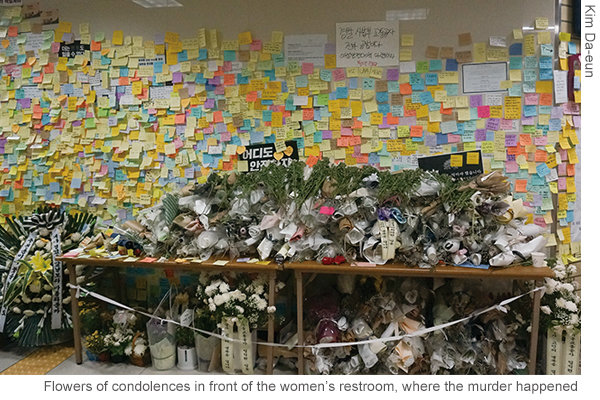
The Stalking Punishment Act, commonly known as anti-stalking law, came into effect on October 21, 2021 to punish stalking. The act applies if the five following conditions are satisfied. First, the act of stalking, or the behavior has to be against the will of the other party. Second, it has to be without a justifiable reason. Third, the crime has to be against the other party, his or her cohabitant, or family member. Fourth, it should cause anxiety or fear to the victim. Last, stalking behavior means any of the following actions: Following or approaching another party to block their path, watching or waiting for the other party on the locations, reaching and delivering objects using the information and communication network system by a third party or in person, and destroying and damaging objects that are placed in the other party’s location.
Before the enactment of the Stalking Punishment Act, society treated stalking crimes as an active courtship behavior or just a misdemeanor. Public opinion also blamed the victim for causing the situation, saying that dealing with emotions can be hard, especially unrequited love. However, after some stalking cases occurred, arguments that stalking cases have to be defined as crime gained strength. The “Nowon Triple Murder” is a prime example of this. Kim Tae-hyun was accused of killing three people, a mother and her two daughters, because he was rejected to be in a relationship with one of the victims, the elder daughter. In this process, he kept stalking the victim and finally, he pretended to be a delivery driver and killed the three women after he broke into their house.
As a result of this, the Stalking Punishment Act was enacted to clarify stalking as a crime and to punish assailants and protect victims in an initial stage by establishing various protection mechanisms, and eventually, intending to establish a sound social order by preventing stalking. Nevertheless, on September 14, 2022, another serious crime occurred, and the victim was killed again.
Preventable, Yet Unprevented Tragedy
“Sindang Station homicide” is an incident occurred by a 31-year-old man Jeon Joo-hwan, a former Seoul Metro employee. He murdered a 28-year-old female colleague, who joined the company with him in the same year, in the women’s restroom at Sindang Station.
From November 2019 to October 2021, he repeatedly harassed the victim and kept contacting her more than 350 times, sending illegal films. On October 7, 2021, Mr. Jeon was charged under the “Act On Special Cases Concerning The Punishment Of Sexual Crimes” and was arrested without a warrant the next day. The Seoul Seobu Police Station and Supreme Prosecutor’s Office Republic of Korea (SPO) requested an arrest warrant, but the Seoul Western District Court dismissed it saying that there was low risk of evidence destruction and flight. The personal protection by the police has been conducted for a month and ended upon the victim’s request.
However, Jeon did not stop contacting the victim even after the protection was provided, justifying that he wants to compensate for damage he caused, from November 2021 to February 2022. The victim reported Jeon with the stalking charge on January 27, 2022 but the police did not request an arrest warrant. Those two cases were merged in the process of trial and the prosecution had sought a sentence of nine years on August 18, 2022. When he was sentenced to 9 years in prison, he decided to kill the victim.
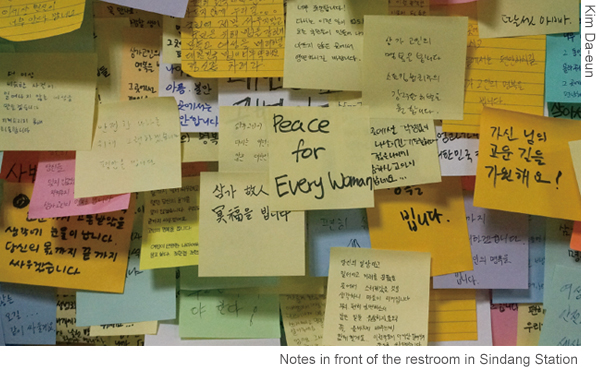
On August 18, September 3, and September 14, he checked her workplace and schedule by visiting the office of Jeungsan and Gusan station, planned the murder and committed a crime. The 28-year-old female colleague was killed by Jeon, even though she requested prosecution of him several times, requesting protection. Her urgent voice and request for help were not accepted by the police properly, and the police did not assess the high-potential risk of this case before the victim was murdered.
The controversial issue of Jeon’s case is not only that another stalking crime has occurred, but the attitude of the police toward this case was complacent. No restraining orders or assailant-focused monitoring measures were taken after the victim requested the police for a personal protection, and they did not provide her a smart-watch to use when emergency happens, or prolong the protection period. Also, the arrest warrant was dismissed by a District Court, categorizing the case as “low risk.” In the second attempt, the arrest warrant was not even requested. For that reason, evaluating the case to be riskless has been a main problem of this incident.
After the Incident
This tragedy made a lot of people furious. People have begun calling for a more realistic solution to prevent such incidents. Although the “anti-stalking law” has been enacted, it did not appear to have been applied to this incident. For this matter, President Yoon said, “Many point out that the anti-stalking law is insufficient to protect victims.
I will not let such a crime happen again.” The victim’s sister said in an interview that Seoul Metro also let the murder happen. She said that despite the fact that there were plenty of chances to separate the victim and the assailant, they did not do so because no one truly understood her sister’s situation. The fact that even if the victim was hurt enough to die, she pressed the emergency bell to make police arrest the assailant also broke people’s hearts.
For the solution, Kim Sang-bum, the CEO of Seoul Metro, said, “We will cancel night duty for female employees and introduce virtual patrolling at the office through CCTV rather than on-site patrolling.” However, cancelling night duty for female employees has evoked criticism. Some say that if female employees are not on night duty, male employees will have to do all the shifts. Moreover, it can be seen that Seoul Metro does not treat female and male workers equally.
The labor union of Seoul Metro pointed out that there has to be a better solution in strengthening the “two-person rule.” Although there is a rule in Seoul Metro, wherein night shift workers must work in pairs, one of them must stay in the station office for paperwork and handle civil complaints. Thus, the labor union asked for an increase in manpower and budget to protect night duty workers.
How About Near the University of Seoul(UOS)?
Given the recent series of incidents, one may worry about safety in Korea. There was a murder in Gangnam station, one of the most crowded stations in Seoul in 2016. The “Anti-stalking Law” was enacted as stalking and other related crimes began to get more serious. UOS campus is quite safe because of the presence of women-friendly streets. There is one of those streets near the back gate of UOS, a residential area for a lot of UOS students. The UOS Times conducted a survey to understand how safe the students feel in/near UOS.
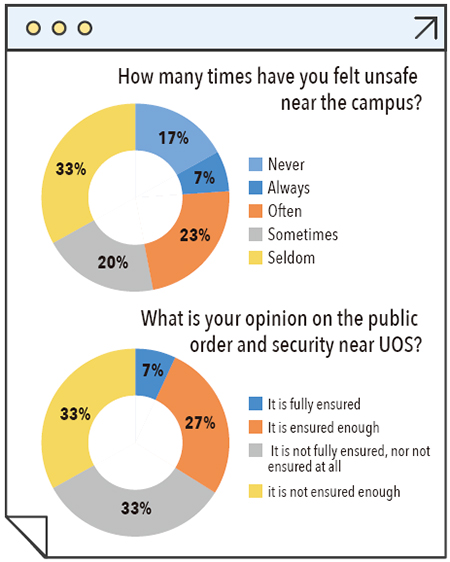
A total of 30 students answered the survey, of whom 13 were women and 17 were men. For the question “How many times have you felt unsafe near the campus?”, 6.7 percent of the respondents said “always,” 22.3 percent said “often,” and 20 percent said “sometimes.” Only five out of 30 students said that they had never felt unsafe. In response to the question, “What is your opinion on the public order and security near UOS?”, 33.3 percent of respondents said that it is not ensured enough, and 33.3 percent of students said it is not fully ensured, nor not ensured at all.
However, there are no students who said that the public order and security are absolutely not ensured at all. Thus, it can be assumed that the public order and security are ensured at some level, but still there are students who feel unsafe.
The UOS Times asked the students why they think as mentioned above. Some said that they did not feel safe enough near UOS. This is because they had personal experiences near the back gate, where some were flashed, or encountered drunken or minacious people. One of the students shared her story in detail, that she had run into a certain man who was known for sexually harassing random female students at UOS Central Library.
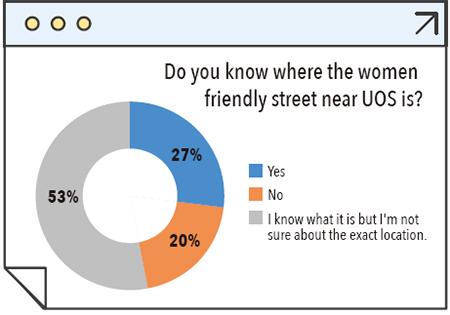
She encountered several men whose behavior caused great displeasure, such as coming too close to make physical contact. Through this series of her experiences, she felt that she was not safe near UOS, and even in the campus. Although there are several respondents that they feel safe enough with the patrol cars, the general public opinion was that the street in the vicinity of the back gate was too narrow and too dark at night. By the back gate of UOS, there is an area called “women-friendly street” and there is a police substation five minutes’ walk away.
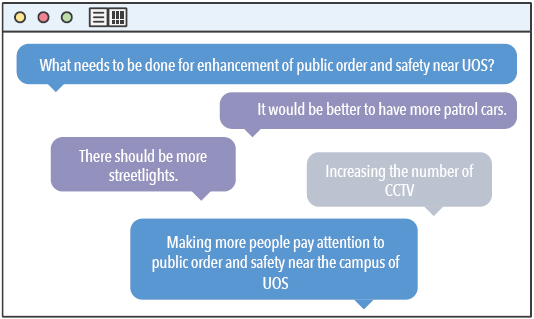
However, the majority of respondents were unaware of this area. One of the respondents said that the area needs to be promoted for both students in UOS and the nearby residents. Another, who lives in the area, said that there are not enough streetlights. The common response to the question “What needs to be done for enhancement of public order and safety near UOS?” was that there should be more streetlights, CCTV, and patrol cars.
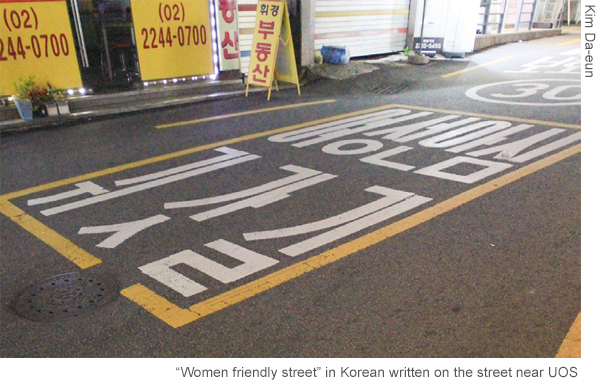
Korea is regarded as one of the safest countries in the world. However, terrible incidents threatening people’s lives are still happening. A lot of women in Korea are yet to feel safe. The homicide in Sindang Station is not just a case, but an indication of the unstable lives that all women in Korea lead. Students in UOS are not safe enough, either. As mentioned above, students have had experiences that made them feel unsafe. To address this state of insecurity, police forces in Korea have to take reports on public order and safety more seriously and deal with them in accordance with protecting the victims. Preventing such tragedies from happening again should be the top priority for the law enforcement.

Kim Da-eun daeunkim749@uos.ac.kr
Lee Seung-hyun nicole3212@uos.ac.kr

